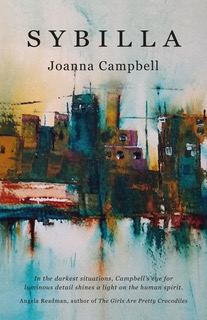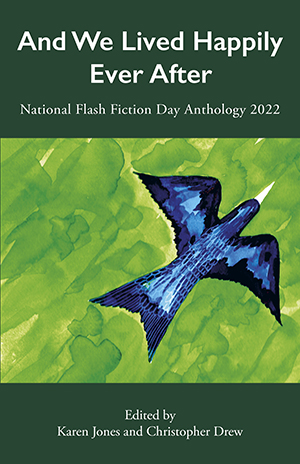Below Jeanette Sheppard talks to Joanna Campbell about Sybilla, winner of National Flash Fiction Day's first ever Novella-in-Flash Award. But before you read on, here’s a taste of what’s between the covers of Joanna’s fabulous book....
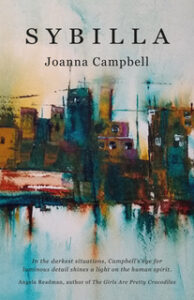 One August morning, the people of West Berlin wake to find their world divided. In the shadow of the Wall, Lara works in a bookshop where customers come and go, bringing regular news about loved ones trapped on the other side. Some strive to maintain connections via telephone and letters, while others plan a more desperate course of action. When a thunderstorm looms over the bookshop, a new customer takes shelter, bringing with him a story that Lara cannot ignore. Sybilla is a story of separation, betrayal, and ultimately, the power of love.
One August morning, the people of West Berlin wake to find their world divided. In the shadow of the Wall, Lara works in a bookshop where customers come and go, bringing regular news about loved ones trapped on the other side. Some strive to maintain connections via telephone and letters, while others plan a more desperate course of action. When a thunderstorm looms over the bookshop, a new customer takes shelter, bringing with him a story that Lara cannot ignore. Sybilla is a story of separation, betrayal, and ultimately, the power of love.
Jeanette: First of all, many congratulations again on winning the Novella-in-Flash Award! Sybilla is wonderful. I’ve read it many times now and each time I discover something new. Sybilla is set in West Berlin when the Wall is being built. Both sides of the Wall are vividly drawn, with the story growing out of the setting. Has setting always been important to you in your work?
Joanna: Thank you so much, Jeanette. I was deeply thrilled when Sybilla won the Novella-in-Flash Award, not least because it was such a pleasure to write, so I’m truly grateful to the NFFD team for running the competition and to judge, Sophie van Llewyn.
Setting can make a vital impact on the narrative. Throughout the years I have been writing, the stories which have proved more successful have often featured either an unusual or a distinctive setting, including several set in desolate areas of North Carolina. Having said that, it isn’t necessary for the location to be geographically specific. For example, I have also set stories in a hairdressing salon, a school science lab and inside a Chinese dragon. The important thing is for the setting to create a unique atmosphere and to shape the characters.
I enjoy writing about the Berlin Wall because of the scope for stories of loss, separation, loneliness, isolation and betrayal. And because it is easy to forget that you can wake up one ordinary morning to find your world divided and those you love out of reach.
The setting can be invented or real, but I do have to know the place. By this I mean I must feel a connection with it, either in my imagination or through reading. (For example, I have never actually been to North Carolina.) It doesn’t matter where or how the inspiration and the emotional link originate. It only matters that I feel confident and inspired. Wherever the setting might be, whether concrete or abstract, it must become the only possible place for my characters to develop.
Jeanette: I’ve heard several writers say that their novella-in-flash developed from a short story. I know this was the case with Sybilla. What persuaded you that this story would work as a novella-in-flash? And could you say a little about what you think are the joys and challenges of writing in this form?
Joanna: Sybilla began as a short story (6,500 words) written eight years ago. I submitted it to a competition, where a shortlisting gave me the confidence to submit it to a magazine. After it was published, I continued thinking about this story, sensing I could create something new and different while retaining the central characters and some plot elements. Eventually I decided to take it apart and completely re-write it as a novella-in-flash.
I developed the main characters, added finer points to the setting and re-tuned the plot. Then came the idea to introduce a small cast of minors, a kind of Greek chorus, to supply a background ‘commentary’. They served the main story in a small way, while also allowing the reader to step aside and see the broader picture of living with the Berlin Wall.
It was wonderful to have an existing piece to cultivate. First of all, I broke the clear-cut scenes apart, then cut these down even further, discarding some and reshaping those with the potential to become flash fiction. Several brand-new scenes were required as well, because after chopping up the original story, I could see bare bones begging to be fleshed out. By transforming the material into flash fiction I could dig deeper into the characters and strengthen the beating heart of the story.
The original Sybilla was in softer focus, the love story aspect at the forefront. For the novella-in-flash version, however, I wanted to illuminate the theme of betrayal. This meant changing the language, tone and, most importantly, the rhythm. They are quite different pieces of writing now, even though they tell a similar story.
The joy, and also the challenge, of writing a novella-in-flash is that it combines the verve and vigour of a flash fiction piece with the mellower unfolding of a longer story, gradually magnifying characters we meet at the most critical point in their lives. It also allows for recurrent motifs and delicate foreshadowing, which, story by story, amplify the theme at the heart of the novella.
Jeanette: This is your second novella-in-flash to be published through a competition, your first, A Safer Way to Fall, was published in How to Make a Window Snake (Ad Hoc Fiction). You have also written a novel Tying Down the Lion (Brick Lane Publishing) and a short story collection, When Planets Slip Their Tracks (Ink Tears). Does your process differ from form to form? Do you have any tips for writers who are thinking about entering a novella-in-flash competition.
Joanna: My process is generally the same. I always edit constantly as I write and focus mostly on the rhythm of the sentences. I never set any word count targets. I’m only interested in the writing itself. The one difference is that I write short fiction in an extemporary way, but make a scene-by-scene plan for novels. Having a plan helps me keep track of the larger number of characters, but also clears a path through potential plot digressions. This makes me feel more secure about the novel’s progression and—hopefully—avoids me repeating the wretchedness of discarding tens of thousands of words which strayed off-course.
I think the best tip I can give for entering a novella-in-flash competition is to know your theme. Once you know it, you have a hook on which the entire novella-in-flash can safely swing. Keep it simple though. The hook should be sharply defined so you can preserve the truth of your story. The hook of Sybilla is betrayal: the people of Berlin are betrayed without warning by the overnight construction of a wall which divides their city. Suspended from the same hook as this ‘big-picture’ betrayal are the more intimate betrayals between the characters, some premeditated, others triggered by the division. The important point here is that both the individual flashes and the complete novella-in-flash all hang from this same hook. I didn’t need to repeat ‘betrayal’ in every paragraph, but I did have to create and maintain an atmosphere of growing distrust and doubt. Respect your hook and make sure your novella stays securely suspended.
Jeanette: Your beautiful painting is on the front cover of Sybilla. Did you create the image especially for your novella? As a fellow artist, I’m interested to know how you schedule your creative work. Do you set aside time aside to paint?
Joanna: Thank you so much, Jeanette. Writing the novella inspired me to paint an abstract city skyline, although it was before I knew Sybilla had won the Novella-in-Flash Award. So I was overjoyed—and honoured—when you suggested using my own artwork and felt this particular painting was predestined for the front cover.
I try to set aside an hour or so for painting at the weekends. I find it helps my writing. It’s a thoughtful time. The imagination runs free and ideas can ferment. I also love making lots of mess.
Jeanette: You have a novel coming out soon, which is also set in Berlin, but this time in the East. Can you tell us about that?
Joanna: Yes, I’m utterly elated that Instructions for the Working Day will be published by Fairlight Books on August 31st. It is a contemporary psychological novel, in which Neil, a young English property developer, sets out to the former East Germany to renovate a marshland village left to deteriorate since the fall of the Berlin Wall. He lodges with Silke, who becomes his only friend within the enigmatic and antagonistic atmosphere of the village. As she prepares to unearth the truth about the trauma she suffered during the Cold War, Neil struggles to confront his own troubled past amid persistent warnings of danger ahead.
Jeanette: And finally, can you tell us about any useful items you keep on your writing desk
Joanna: Yes, my middle daughter made me an elegant woolen lady complete with stylish dress and pearls, known in our house as my kniterary agent.
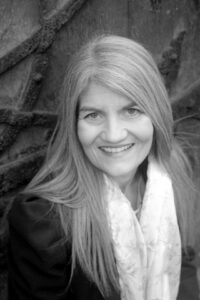 Joanna Campbell is a full-time writer from the Cotswolds. Her short stories have won first place in the Exeter Writers competition, the Bath Short Story Award Local Prize, the London Short Story Prize, the Magic Oxygen Literary Prize and the Retreat West Short Story Prize.
Joanna Campbell is a full-time writer from the Cotswolds. Her short stories have won first place in the Exeter Writers competition, the Bath Short Story Award Local Prize, the London Short Story Prize, the Magic Oxygen Literary Prize and the Retreat West Short Story Prize.
Joanna’s flash-fiction won second place in the 2017 Bridport Prize, for which her short stories have been shortlisted many times.
Her novella-in-flash, A Safer Way to Fall, was a runner-up in the inaugural Bath Flash Fiction Award and published in How To Make A Window Snake (Ad Hoc Fiction). Her short story collection, When Planets Slip Their Tracks was shortlisted for the Rubery International Book Award and longlisted for the Edge Hill University Prize.
Her novel, Instructions for the Working Day, will be published in August 2022 (Fairlight Books).

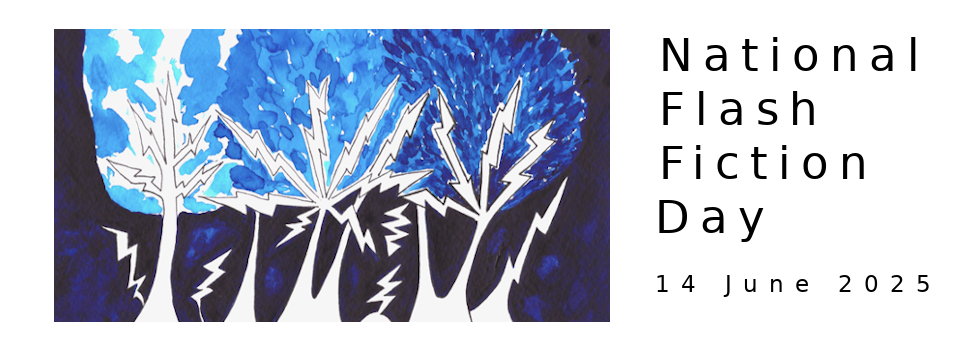
 Joanna Campbell is a full-time writer from the Cotswolds. Her short stories have won first place in the Exeter Writers competition, the Bath Short Story Award Local Prize, the London Short Story Prize, the Magic Oxygen Literary Prize and the Retreat West Short Story Prize.
Joanna Campbell is a full-time writer from the Cotswolds. Her short stories have won first place in the Exeter Writers competition, the Bath Short Story Award Local Prize, the London Short Story Prize, the Magic Oxygen Literary Prize and the Retreat West Short Story Prize.